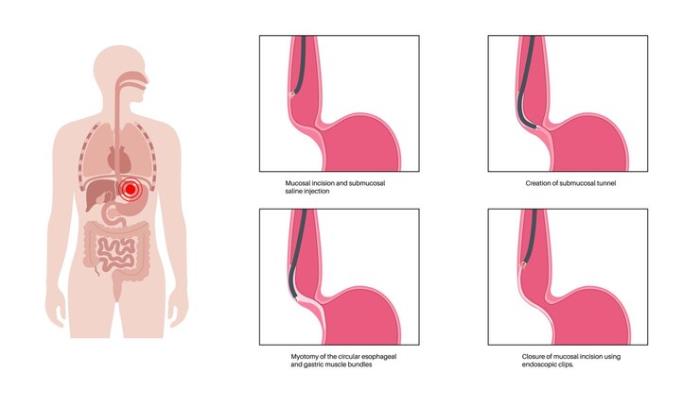Esophageal cancer is a malignancy that develops in the tissues of the esophagus, the tube that carries food from the throat to the stomach. Treatment options for esophageal cancer typically include surgery, radiation therapy, and chemotherapy. Among these, surgical intervention plays a crucial role, particularly in cases where the cancer is localized and operable.
Medical disclaimer: This content is for general awareness and does not replace a doctor’s consultation. For diagnosis or treatment decisions, consult a qualified specialist.
Defining Minimally Invasive Surgery for Esophageal Cancer
Minimally invasive surgery (MIS) refers to surgical techniques that limit the size of incisions needed to perform an operation. For esophageal cancer, this often involves techniques such as laparoscopy and thoracoscopy, which utilize small incisions and specialized instruments. This approach is designed to reduce recovery time and improve overall patient outcomes.
Advantages of Minimally Invasive Surgery for Esophageal Cancer
One of the primary benefits of minimally invasive surgery is the reduction in postoperative pain. Patients typically experience less discomfort compared to traditional open surgery, which can result in a more comfortable recovery process. Additionally, this technique can lead to a shorter hospital stay.

Reduced Risk of Complications with Minimally Invasive Techniques
Minimally invasive surgery is associated with a lower risk of complications such as infection and bleeding. The smaller incisions used in MIS result in less trauma to the body, which can contribute to a more favorable recovery trajectory for patients.
Enhanced Recovery Times After Minimally Invasive Surgery
Patients undergoing minimally invasive surgery for esophageal cancer often experience faster recovery times. Many patients are able to return to their normal activities sooner than those who have undergone traditional surgical approaches, which can significantly improve their quality of life.
Improved Cosmetic Outcomes from Smaller Incisions
One of the less often discussed benefits of minimally invasive surgery is the improved cosmetic outcome. The smaller incisions typically result in less scarring, which can be a significant concern for many patients. This can enhance the overall satisfaction with the surgical experience.
Minimally Invasive Techniques and Patient Selection Criteria
Not all patients with esophageal cancer are candidates for minimally invasive surgery. Factors such as the stage of cancer, overall health, and specific anatomical considerations must be assessed. A thorough evaluation by a multidisciplinary team is essential to determine the best surgical approach.
Technological Advancements in Minimally Invasive Surgery
Advancements in robotic surgery and laparoscopic techniques have significantly enhanced the capabilities of surgeons performing minimally invasive procedures. These technologies allow for greater precision and control, leading to improved surgical outcomes for patients with esophageal cancer.
Long-Term Outcomes of Minimally Invasive Surgery for Esophageal Cancer
Research indicates that patients who undergo minimally invasive surgery for esophageal cancer often experience comparable long-term survival rates to those who have traditional open surgery. This has made MIS a preferred option for many oncologists and surgeons.

Patient Education and Informed Consent for Minimally Invasive Surgery
Informed consent is critical in the surgical process. Patients should be well-informed about the risks, benefits, and alternatives associated with minimally invasive surgery. This education empowers patients to make decisions that align with their values and health goals.
Postoperative Care After Minimally Invasive Surgery
Postoperative care following minimally invasive surgery is essential for optimal recovery. Patients should follow their surgeon's guidelines regarding activity restrictions, diet modifications, and follow-up appointments to ensure a smooth recovery process.
Potential Risks and Limitations of Minimally Invasive Surgery
While minimally invasive surgery offers numerous benefits, it is not without risks. Potential complications may include anesthesia-related issues, organ injury, or incomplete tumor resection. Understanding these risks is vital for patients considering this surgical option.
Role of a Multidisciplinary Team in Surgical Decision Making
A multidisciplinary team plays a crucial role in the management of esophageal cancer, including surgical decision-making. This team typically includes oncologists, surgeons, radiologists, and nutritionists, ensuring a comprehensive approach to patient care.
Comparative Analysis: Traditional vs. Minimally Invasive Surgery
When comparing traditional open surgery to minimally invasive surgery, the latter generally offers reduced pain, shorter recovery times, and fewer complications. However, the choice of surgical method should be personalized based on the patient's specific circumstances and preferences.
Future Directions in Minimally Invasive Surgery for Esophageal Cancer
Ongoing research is focused on enhancing the techniques and technologies used in minimally invasive surgery. Innovations such as augmented reality and improved imaging techniques may further improve surgical precision and patient outcomes in the future.
Patient Testimonials on Minimally Invasive Surgery Experiences
Patient testimonials often highlight the positive experiences associated with minimally invasive surgery. Many patients report quicker recoveries, less pain, and overall satisfaction with their surgical outcomes, reinforcing the value of this approach in esophageal cancer treatment.
Insurance Coverage and Financial Considerations for Surgery
Patients should be aware of the potential financial implications of minimally invasive surgery. Insurance coverage can vary, and it is advisable to consult with insurance providers to understand the extent of coverage for surgical procedures related to esophageal cancer.
Role of Endoscopic Procedures in Esophageal Cancer Management
Endoscopic procedures play a vital role in diagnosing and managing esophageal cancer. Role of endoscopic procedures in esophageal cancer management explores how techniques like endoscopic ultrasound and mucosal resection offer minimally invasive options for early detection and treatment, improving patient outcomes and reducing recovery times.
Understanding Survival Rates for Esophageal Cancer Patients
Survival rates provide critical insights into the effectiveness of treatment strategies and prognosis for patients. Understanding survival rates for esophageal cancer patients delves into factors that influence these rates, including early diagnosis, advancements in treatment, and lifestyle changes post-therapy.
Importance of Follow-Up Care Post-Surgery
Follow-up care is essential for monitoring recovery and detecting any potential recurrence of cancer after minimally invasive surgery. Regular check-ups and imaging studies are vital components of post-surgical care to ensure long-term health.
Best Esophageal Cancer Treatment in India
The Best Esophageal Cancer Treatment in India involves advanced techniques such as minimally invasive esophagectomy, chemotherapy, and radiation therapy for effective cancer management.
Best Esophageal Cancer Specialists in India
The Best Esophageal Cancer Specialists in India have extensive experience in treating esophageal cancer, offering tailored treatment plans and compassionate care to achieve optimal outcomes.
FAQs About Minimally Invasive Surgery for Esophageal Cancer
What is the recovery time for minimally invasive surgery?
The recovery time for minimally invasive surgery is typically shorter than that for traditional surgery, often ranging from a few days to a couple of weeks, depending on individual health factors.
Who is a candidate for minimally invasive surgery?
Candidates for minimally invasive surgery include patients with localized esophageal cancer who are in good overall health. A thorough evaluation by a multidisciplinary team is necessary to determine candidacy.
What are the potential risks of minimally invasive surgery?
Potential risks include infection, bleeding, and complications related to anesthesia. However, these risks are generally lower than those associated with traditional open surgery.
How does minimally invasive surgery compare to traditional surgery?
Minimally invasive surgery typically results in less pain, shorter hospital stays, and quicker recovery times compared to traditional surgery, making it a preferred option when appropriate.
Discover the Best Oncologists and Cancer Hospitals in India
When it comes to cancer treatment, finding the right specialist and hospital can make a significant difference in the outcome. In this blog, we have compiled a list of the top oncologists and cancer hospitals across major cities in India, ensuring that you have access to the best care available.
Top Oncologists in Major Cities
For those seeking expert oncologists, we have identified the best specialists in key cities:
Leading Cancer Hospitals
In addition to finding the right specialist, choosing the right hospital is crucial for comprehensive cancer care. Here are the top hospitals in major cities:
Get more indepth information on Cancer treatments and their costs
Conclusion
Finding the right oncologist and hospital is the first step in your cancer treatment journey. Explore the links above to learn more about the top specialists and hospitals in your area.
Discover the critical role of endoscopic procedures in managing esophageal cancer, including diagnosis, treatment, and palliation. Learn about techniques like endoscopic submucosal dissection (ESD) and endoscopic mucosal resection (EMR), and how they contribute to early detection, potential cure, and symptom management. Role of Endoscopic Procedures in Esophageal Cancer Management
This page provides comprehensive information on managing swallowing difficulties (dysphagia) in patients with esophageal cancer. It covers causes, symptoms, diagnostic methods, and various treatment options, including dietary modifications, swallowing therapy, and medical interventions. Managing Swallowing Difficulties in Esophageal Cancer Patients
This page explores the latest advancements in esophageal reconstruction following cancer surgery. It highlights innovative surgical techniques, improved postoperative care protocols, and emerging technologies aimed at enhancing patient outcomes and quality of life. Advances in Esophageal Reconstruction After Cancer Surgery